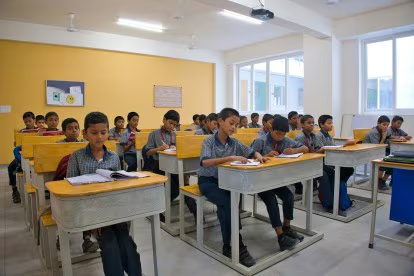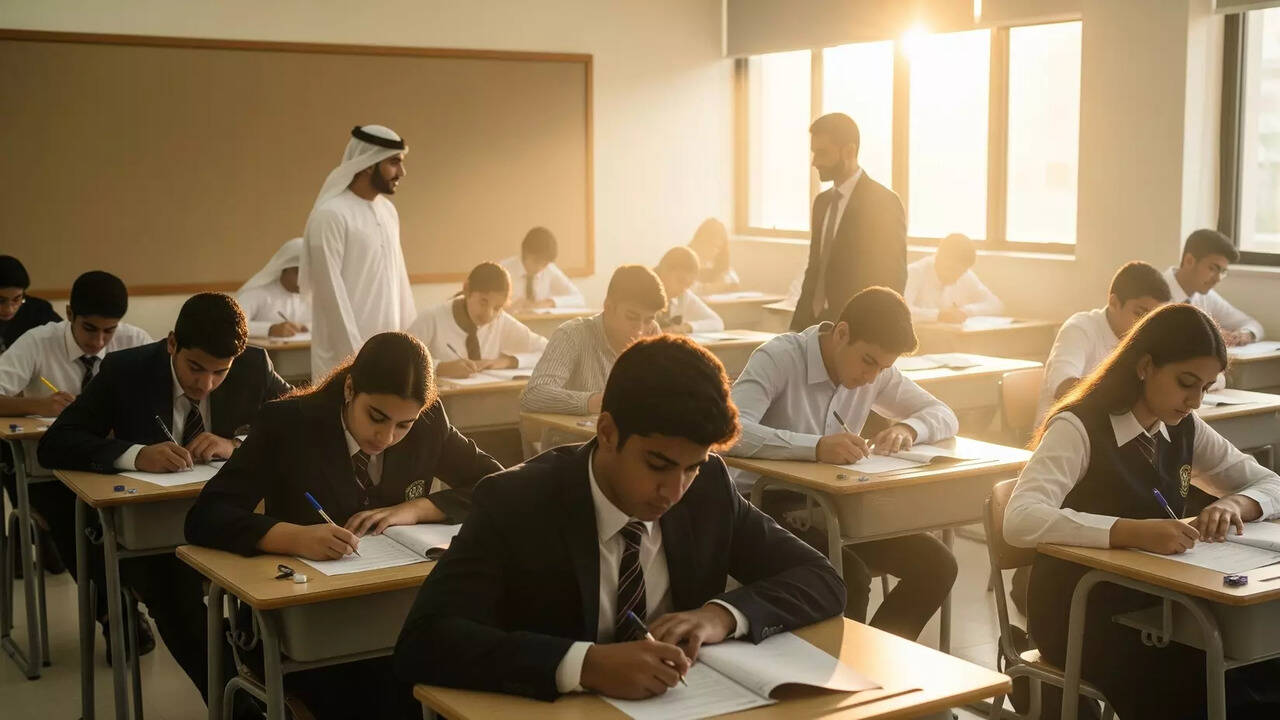The education system in the UAE has taken a bold step forward with the announcement that there will be no second-term exams for students across all grades starting from the 2025–26 academic year. This major reform marks a turning point in how students will experience learning and assessment, aiming to reduce academic stress and encourage a more holistic approach to education. For years, parents, teachers, and learners have debated the pressure of repeated testing, and this change reflects the UAE’s commitment to progressive and student-focused learning models.
Why the second-term exams were removed
The removal of second-term exams did not come overnight. Education policymakers have been studying the challenges faced by students under traditional academic systems. Repeated exams often created unnecessary stress, reduced time for real learning, and turned education into a race for marks instead of knowledge. By eliminating this particular round of testing, schools can now focus more on skill-building, critical thinking, creativity, and personal growth. This decision also reflects international best practices where fewer formal exams are used, and more emphasis is placed on project-based and continuous assessment.
How students will be assessed now
Without second-term exams, many parents and students are curious about what will replace them. Instead of traditional question papers, the UAE education system will introduce a blended approach that combines class participation, assignments, projects, and periodic quizzes. Teachers will be given more flexibility to evaluate students’ progress in real-time rather than relying on high-pressure exams. This means a student’s performance will be judged more on consistency, understanding, and application rather than their ability to memorize and reproduce information under exam conditions.

Benefits for students’ mental health
The mental health of students has always been a rising concern in the UAE, as in many countries worldwide. By removing the burden of a second-term exam, students can look forward to a more balanced school year. Less exam pressure means more time for extracurricular activities, hobbies, and social development. Studies from around the globe show that exam-related anxiety can severely impact a child’s confidence and learning abilities. This reform is a direct attempt to create an education system where mental health is as important as academic performance.
A boost for creativity and innovation
One of the most exciting outcomes of this change is the new space it creates for creativity and innovation in classrooms. Teachers will be encouraged to adopt more practical methods such as project-based learning, group collaborations, debates, and real-world problem-solving exercises. These activities not only make learning enjoyable but also equip students with skills that will serve them well beyond school walls. Instead of just preparing for the next exam, learners will now have the freedom to explore, question, and experiment.
What parents need to know
For parents, this change brings both relief and curiosity. Many parents have often worried about the stress their children endure during exam periods, especially when multiple exams are packed into a short time frame. With the removal of second-term exams, parents can expect a smoother academic schedule for their children. They will need to adapt to a system where results are more spread out through the year and where projects and assignments carry more weight. It will also require parents to become more engaged in their child’s daily learning journey instead of waiting for exam results to measure progress.
The role of teachers in the new system
Teachers will be at the heart of this transformation. Without the rigid format of second-term exams, they now have the opportunity to design creative assessments that truly capture each student’s abilities. However, this also means added responsibility as teachers will need to maintain detailed performance records and ensure fairness in evaluations. Training programs and workshops are already being planned to support educators in adjusting to this system. With the right tools and guidance, teachers will be able to strike the perfect balance between academic assessment and nurturing overall development.
Preparing students for the future
The UAE has long emphasized the importance of preparing students for future careers in an evolving global economy. The removal of second-term exams is more than just a short-term adjustment it is a step toward building learners who are resilient, adaptable, and innovative. In modern workplaces, skills like problem-solving, creativity, teamwork, and communication are valued as much as academic knowledge. By focusing less on memorization and more on real-world application, the new assessment system aligns education with the demands of the future.
Comparing with international systems
Globally, many education systems have shifted away from heavy reliance on exams. Finland, for example, is known for its minimal exam structure, focusing instead on project-based learning and teacher assessments. Singapore has also taken steps in recent years to reduce testing pressure in early grades. The UAE is now joining this global movement by finding its own model that fits its diverse student population. By doing so, it positions itself as a forward-thinking nation in education reform.
Reactions from students
Not surprisingly, students across the UAE are celebrating this decision. Many have shared that the pressure of preparing for multiple exam seasons in a year often left them drained and distracted from truly enjoying learning. With one less round of exams to worry about, they can dedicate more time to interests, sports, and personal projects. Students who often struggled with exam anxiety now have a system that values their effort and participation throughout the year instead of just one test day.
Reactions from parents
Parents’ responses have been largely positive, with many calling this a much-needed reform. Some parents admitted that they often felt helpless watching their children go through exam stress. This new structure will give families more breathing space and allow children to focus on consistent learning. However, some parents also wonder if continuous assessments will put more pressure on daily performance. To address this, schools are working on transparent evaluation methods to ensure fairness and clarity for both students and parents.
Reactions from teachers
Teachers are both excited and cautious. On one hand, they now have the chance to design creative teaching methods without being bound by strict exam timetables. On the other hand, the workload of tracking student progress consistently will increase. Many teachers have expressed hope that with proper training and support, they can use this system to bring out the best in every learner. Their role as mentors and guides will be more critical than ever.

Long-term vision for UAE education
This reform fits into the UAE’s long-term vision of building one of the most advanced education systems in the world. By reducing stress and focusing on skills, the country aims to nurture a generation of confident, capable, and forward-thinking individuals. The decision to remove second-term exams may seem like a single change, but it is a signal of larger reforms that could reshape how education is delivered and experienced in the future.
Challenges that may arise
No major reform comes without its challenges. Some parents and teachers worry that without second-term exams, students may take academics less seriously. Others are concerned about how universities will evaluate applicants if exams carry less weight. These are valid concerns, and the UAE education authorities are already working on solutions such as standardized year-end assessments and competency-based records that can serve as reliable indicators of performance. The transition may take time, but the focus remains on creating a healthier balance in education.
A step toward reducing inequality
Exams often favor students who excel under pressure, while many talented learners are left behind simply because they do not perform well in stressful situations. By eliminating one round of exams, the UAE is also addressing this imbalance. Continuous assessments allow students with different learning styles and strengths to showcase their abilities. Whether it is through art, projects, teamwork, or presentations, every child gets the chance to shine. This step contributes to reducing inequality in classrooms and making education more inclusive.
What lies ahead for students
As the 2025–26 academic year approaches, students can look forward to a very different school experience. Instead of preparing for another cycle of exam pressure, they will engage in activities that challenge their thinking and creativity. They will have more opportunities to collaborate with peers, showcase their skills in different formats, and learn in ways that are meaningful. This is not just a relief from exams but a shift toward a richer educational journey.
Conclusion: A brighter, stress-free future for UAE learners
The removal of second-term exams across all grades in the UAE marks a historic moment in the country’s educational landscape. It is not simply about reducing the number of exams; it is about reshaping the entire learning experience to prioritize mental well-being, creativity, and real-world skills. Students will benefit from less stress, parents will see healthier children, and teachers will find more meaningful ways to engage with learners.
This reform highlights the UAE’s commitment to building a world-class education system that looks beyond grades and focuses on nurturing the leaders of tomorrow. The 2025–26 academic year will be remembered as the year when learning became less about exams and more about growth, curiosity, and lifelong success.
Do follow Gulf Magazine on Instagram.
Also Read – Abu Dhabi Police Confirm Al Ain Street Speed Limit Stays 100 km/h



